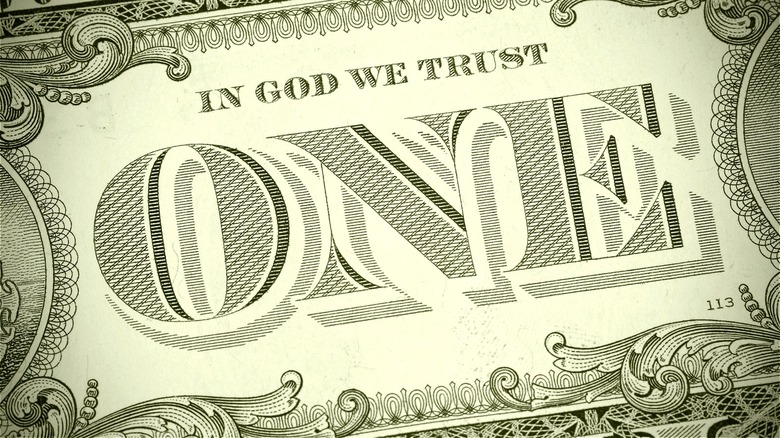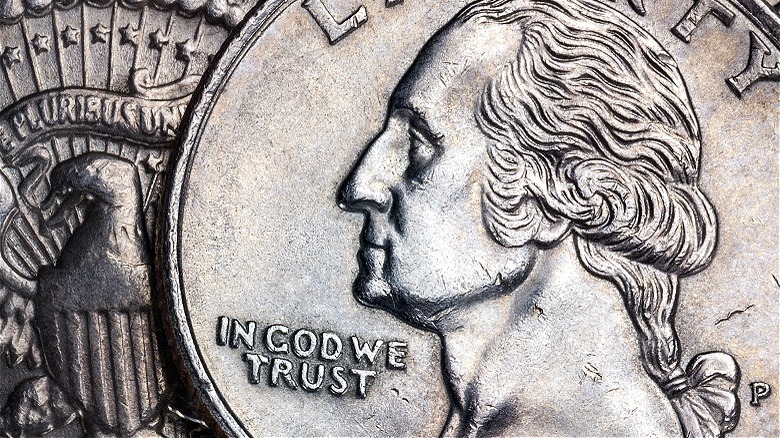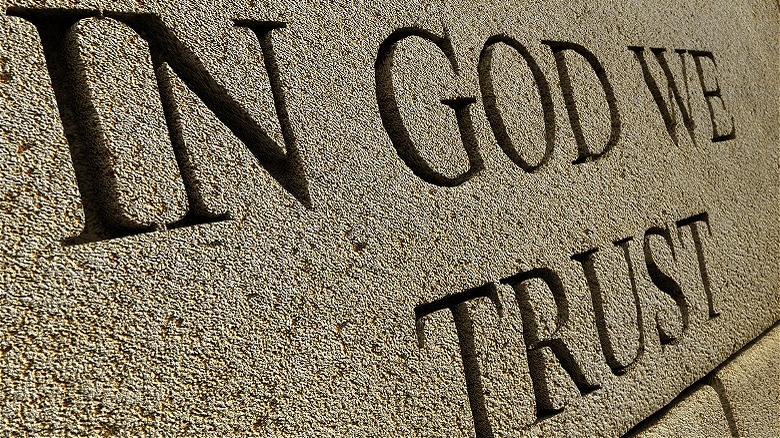Why Is 'In God We Trust' On US Currency?
The United States Constitution doesn't include any mention of God, and the First Amendment's Establishment Clause expressly prohibits the country from establishing an official country religion. In fact, the separation of church and state has long maintained its status as an important tenet of U.S. government policy. How, then, does U.S. currency have a phrase like "In God We Trust" printed quite boldly on it? Similarly, how did this phrase become the country's official motto? For starters, it's important to realize that the inclusion of this specific phrase in official government capacities came long after the actual creation of the country.
It wasn't until the beginning of the Civil War, 69 years after the creation of the U.S. Mint (aka the development of the country's currency), and 74 years after the U.S. Constitution was signed, that the Department of the Treasury considered adding any reference to God to U.S. currency. According to Treasury Department records, the secretary of the Treasury at the time, Salmon P. Chase, received the first request for God's inclusion in 1861. However, these requests contained a broad variety of different proposed phrases and sentiments, with the only real theme being that the word "God" be included. Ultimately, due in large part to an increased religious sentiment during the war, Secretary Chase moved forward with the word's inclusion. He directed the U.S. Mint that "No nation can be strong except in the strength of God, or safe except in His defense. The trust of our people in God should be declared on our national coins."
History of the phrase
In 1837, Congress passed laws on coin designs that specifically defined what mottos and symbols could be included in American coinage. This meant that, despite the Treasury secretary's intentions in 1861, it was ultimately up to Congress to pass new legislation that would allow for the inclusion of a reference to God on U.S. currency. In 1864, the phrase "In God We Trust" began appearing on one-cent and two-cent coins. However, the phrase did not become a universal inclusion on all U.S. currencies at this time. In fact, it wasn't until 1938 that the motto officially appeared on all coinage, and it wasn't until 1957 that the phrase first appeared on paper currency.
Similar to how the Civil War influenced the inclusion of God on U.S. coins, the Cold War had a significant impact on the inclusion of the phrase "In God We Trust" on the country's paper currency. This was again due to a swell in religious sentiment, this time as a seeming protest in opposition to the Soviet Union's official atheism. In 1956, Congress passed a joint resolution (signed by President Eisenhower) declaring the phrase the new national motto of the United States. This newly minted motto then appeared on the back of the dollar bill beginning on October 1, 1957. The phrase didn't appear on all U.S. paper currency until 1966 — a full 174 years after the creation of the U.S. Mint and 178 years after the U.S. Constitution was ratified.
Controversy over the motto
Despite the phrase "In God We Trust" being included on U.S. currency now for over 150 years, the inclusion of God in official government contexts hasn't been without controversy. Numerous court cases have been brought forward throughout the years (at the state and federal levels), challenging both the constitutionality of the phrase as well as whether references to God violate the separation of church and state. However, despite attempts, courts have rather unanimously upheld the use of the motto, determining that the phrase isn't inherently religious.
A famous 2004 case, Elk Grove Unified School District v. Newdow, went as far as the Supreme Court to determine if using the phrase "Under God" in the "Pledge of Allegiance" was constitutional. The Court bypassed deciding on the constitutionality of the case but Justices Rehnquist and Thomas both made sure to include their support of the phrase in concurring opinions, claiming that reciting it didn't constitute a religious exercise. Similarly, Justice O'Connor wrote, "I believe that government can, in a discrete category of cases, acknowledge or refer to the divine without offending the Constitution."
Michael Newdow brought forward another lawsuit in 2006 (Newdow v. Congress of the United States), but a federal judge from the Eastern District of California wrote that "The national motto is excluded from First Amendment significance because the motto 'has no theological or ritualistic impact' and is of a purely secular, 'patriotic' and 'ceremonial character.'" A similar case regarding "In God We Trust" on U.S. currency was rejected by the 2nd U.S. Circuit Court of Appeals in 2014.


